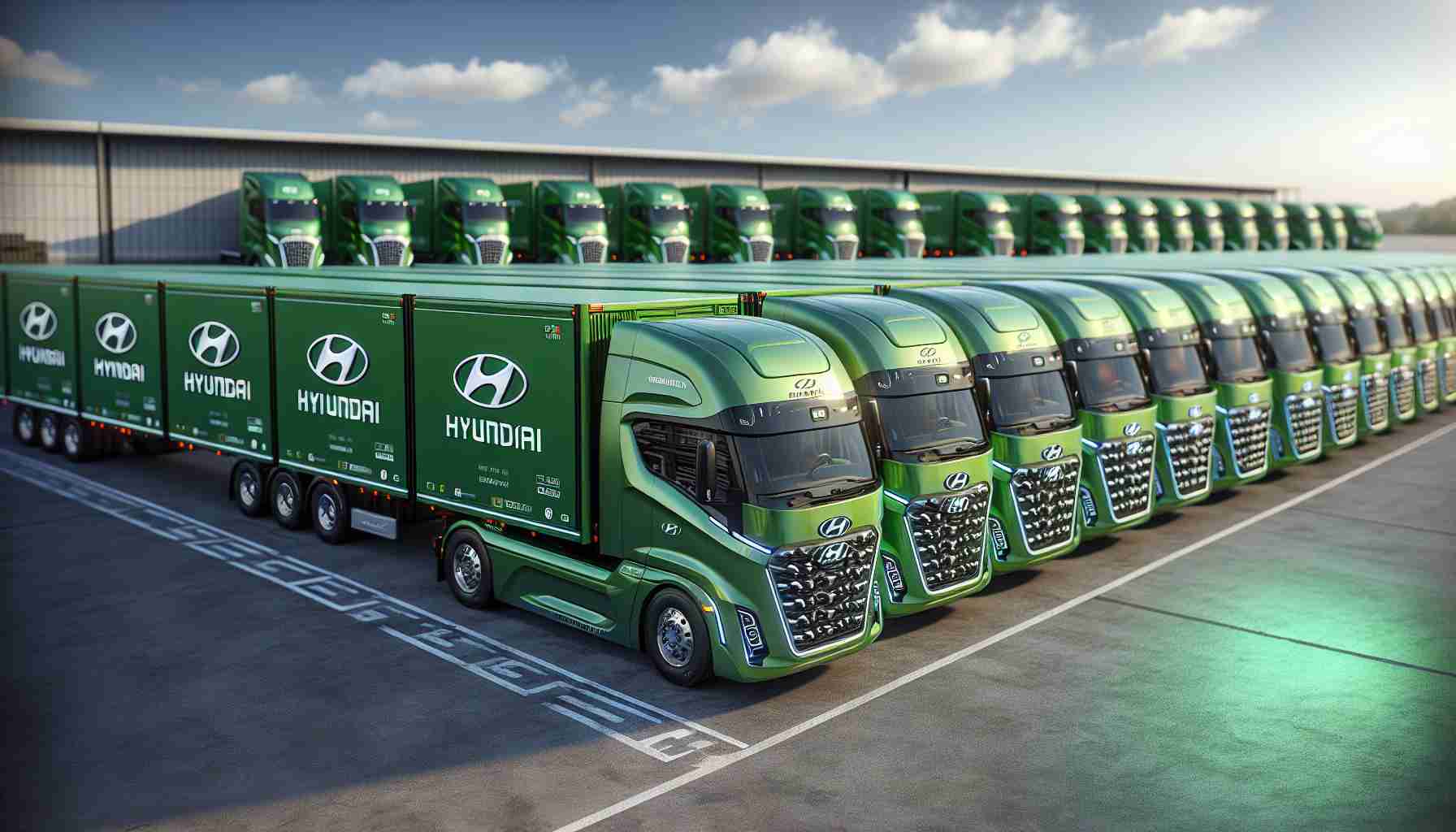Hyundai Leads the Charge in Sustainable Transportation
In a groundbreaking move, Hyundai Motor Group Metaplant America (HMGMA) has launched an impressive fleet of hydrogen fuel-cell electric trucks, specifically the Hyundai Xcient, to enhance its logistics operations. This ambitious project, achieved in collaboration with Glovis America, features 21 state-of-the-art Xcient Class 8 trucks, dedicated to supporting HMGMA’s Megasite while significantly reducing carbon emissions.
This initiative reflects a strong commitment to environmentally friendly logistics. By incorporating hydrogen fuel-cell technology, Hyundai is paving the way for a cleaner transportation future and demonstrating a significant step towards sustainability.
The Hyundai Xcient trucks are tasked with transporting vehicle components from local suppliers to the Megasite on a daily basis. Initially, the trucks will shuttle parts to an on-site Consolidation Center, but plans are in place for expanded operations as HMGMA continues to enhance its logistics framework. Remarkably, this fleet of 21 trucks represents more than a third of Glovis America’s operations at the facility.
Additionally, Hyundai has introduced HTWO, its comprehensive hydrogen value chain brand aimed at optimizing all aspects of hydrogen utilization. In partnership with Glovis America, HTWO Logistics plans to establish both mobile and permanent hydrogen refueling stations at the Megasite, further cementing Hyundai’s role in the hydrogen economy and its dedication to a sustainable future.
The Broader Implications of Hyundai’s Hydrogen Initiative
Hyundai’s strategic investment in hydrogen fuel-cell technology signals not just a shift in corporate logistics but also heralds a potential transformation in global transportation dynamics. As major automotive manufacturers venture into sustainable technologies, this move is likely to catalyze a broader trend towards decarbonization within the industry. Reducing reliance on fossil fuels can mitigate the impacts of climate change—a pressing issue that affects ecosystems, economies, and communities worldwide.
On a societal level, the introduction of hydrogen-powered vehicles could stimulate job creation in emerging sectors. The need for skilled workers in the hydrogen supply chain, from production to refueling infrastructure, presents a unique opportunity. In regions strategically aligned with hydrogen initiatives, local economies could thrive as investments flow into cleaner, innovative technologies.
From an environmental perspective, the implications are equally significant. Hydrogen fuel-cell vehicles emit only water vapor, presenting a path forward to achieving carbon neutrality. This aligns with global initiatives aimed at reducing greenhouse gas emissions, further supporting international climate agreements like the Paris Accord.
Given the rising emphasis on sustainability, future trends could see accelerated adoption of hydrogen technology, not just in transportation but across various industrial applications. As Hyundai’s operations expand, it serves as a framework for other companies to follow suit, fostering a more interconnected hydrogen economy that promises to reshape energy consumption patterns and drive positive ecological change in the long run.
Hyundai Revolutionizes Logistics with Hydrogen Fuel-Cell Trucks
Hyundai Leads the Charge in Sustainable Transportation
Hyundai Motor Group Metaplant America (HMGMA) is making significant strides in the realm of sustainable logistics by launching a fleet of hydrogen fuel-cell electric trucks, specifically the Hyundai Xcient. This initiative is not only a major step towards reducing carbon emissions but also positions Hyundai as a leader in environmentally friendly transportation solutions.
Key Features of the Hyundai Xcient Trucks
The Hyundai Xcient trucks are equipped with advanced hydrogen fuel-cell technology that enables them to transport vehicle components efficiently. Here are some key features:
– Zero Emissions: The hydrogen fuel cells emit only water vapor, providing an environmentally-friendly alternative to traditional diesel trucks.
– High Efficiency: The Xcient delivers excellent fuel economy, reducing overall logistics costs and energy consumption.
– Robust Design: Built for heavy-duty operations, these Class 8 trucks are optimized for transporting large payloads across various terrains.
Use Cases and Operational Efficiency
The fleet of 21 Xcient trucks is primarily focused on transporting vehicle components from local suppliers to HMGMA’s Megasite. Initially, these trucks will serve an on-site Consolidation Center, facilitating streamlined logistics operations. Over time, Hyundai plans to expand the fleet’s functionality, enhancing operational efficiency within the facility.
Pros and Cons of Hydrogen Fuel-Cell Technology
Pros:
– Environmentally Sustainable: Reduces reliance on fossil fuels and minimizes carbon footprint.
– Energy Security: Hydrogen can be produced from various domestic resources, enhancing energy independence.
– Performance: Hydrogen fuel cells offer faster refueling times compared to battery electric vehicles.
Cons:
– Infrastructure Challenges: The need for extensive hydrogen refueling stations can limit immediate adoption.
– Cost Considerations: Hydrogen production and fuel cell technology can be more expensive than traditional fuel sources.
Innovations and Future Trends
Hyundai’s initiative also encompasses HTWO, a brand dedicated to advancing the hydrogen economy. This comprehensive hydrogen value chain brand aims to enhance the efficiency and accessibility of hydrogen use across various sectors. The partnership with Glovis America includes plans for establishing mobile and permanent hydrogen refueling stations at the Megasite, highlighting a forward-thinking approach to logistics.
Predictions for Hydrogen in Logistics
Experts predict that the demand for hydrogen fuel-cell vehicles in logistics will continue to grow. As companies seek to meet stricter environmental regulations and consumers demand sustainable practices, investments in hydrogen technology are expected to proliferate. This trend could potentially lead to widespread adoption of hydrogen vehicles across various sectors beyond just logistics.
Pricing and Market Analysis
As of now, the market for hydrogen fuel-cell vehicles is poised for growth. While initial costs may be higher than conventional vehicles, decreasing production costs and increasing infrastructure support are expected to improve the economic viability of hydrogen solutions. Hyundai’s robust entry into this market through innovative technologies and strategic partnerships indicates a promising outlook for sustainable transportation.
For more information on Hyundai’s initiatives and innovations, visit Hyundai USA.









